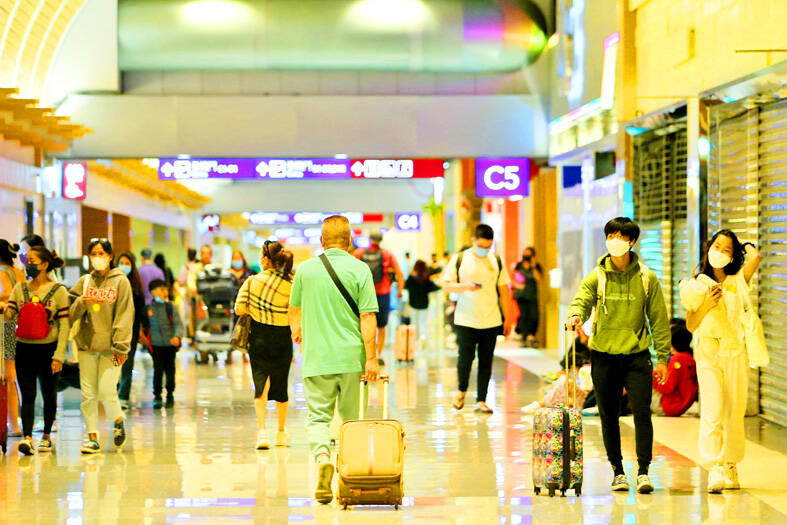Air travel is likely to resume fully in most areas next year, and should return to pre-COVID-19 pandemic levels in 2024-2025, Boeing Co product marketing director for commercial airplanes Thomas Sanderson told an online media briefing yesterday.
Some airlines’ operations have returned to 2019 levels and the speed of recovery in different markets mainly depends on border controls adopted by their governments, Sanderson said.
Asked whether the recent Chinese military drills had affected the aviation industry in Asia, Sanderson said that it is inappropriate for the company to speculate on the situation, but it is vital that Boeing works with all stakeholders in the countries it operates in and to have dialogue if necessary.

However, the company expects to see increasing demand for air travel in Asia, he said, adding that other markets have seen growth.
Boeing’s 787 Dreamliner family dominates the wide-body aircraft market with a market share of 59 percent, he said, adding that it has 712 repeat orders from 47 customers — compared with 204 repeat orders for Airbus SE’s A350 family.
Sanderson did not disclose Boeing’s forecast for the Taiwanese market, only saying that the company would issue its regional forecast in October and it is always engaged with airlines that are interested in its products.
Greater Asia has better potential for long-term growth, so Boeing will focus on this market, Sanderson said.

BYPASSING CHINA TARIFFS: In the first five months of this year, Foxconn sent US$4.4bn of iPhones to the US from India, compared with US$3.7bn in the whole of last year Nearly all the iPhones exported by Foxconn Technology Group (富士康科技集團) from India went to the US between March and last month, customs data showed, far above last year’s average of 50 percent and a clear sign of Apple Inc’s efforts to bypass high US tariffs imposed on China. The numbers, being reported by Reuters for the first time, show that Apple has realigned its India exports to almost exclusively serve the US market, when previously the devices were more widely distributed to nations including the Netherlands and the Czech Republic. During March to last month, Foxconn, known as Hon Hai Precision Industry

Taiwan Semiconductor Manufacturing Co (TSMC, 台積電) and the University of Tokyo (UTokyo) yesterday announced the launch of the TSMC-UTokyo Lab to promote advanced semiconductor research, education and talent development. The lab is TSMC’s first laboratory collaboration with a university outside Taiwan, the company said in a statement. The lab would leverage “the extensive knowledge, experience, and creativity” of both institutions, the company said. It is located in the Asano Section of UTokyo’s Hongo, Tokyo, campus and would be managed by UTokyo faculty, guided by directors from UTokyo and TSMC, the company said. TSMC began working with UTokyo in 2019, resulting in 21 research projects,

Ashton Hall’s morning routine involves dunking his head in iced Saratoga Spring Water. For the company that sells the bottled water — Hall’s brand of choice for drinking, brushing his teeth and submerging himself — that is fantastic news. “We’re so thankful to this incredible fitness influencer called Ashton Hall,” Saratoga owner Primo Brands Corp’s CEO Robbert Rietbroek said on an earnings call after Hall’s morning routine video went viral. “He really helped put our brand on the map.” Primo Brands, which was not affiliated with Hall when he made his video, is among the increasing number of companies benefiting from influencer

Quanta Computer Inc (廣達) chairman Barry Lam (林百里) yesterday expressed a downbeat view about the prospects of humanoid robots, given high manufacturing costs and a lack of target customers. Despite rising demand and high expectations for humanoid robots, high research-and-development costs and uncertain profitability remain major concerns, Lam told reporters following the company’s annual shareholders’ meeting in Taoyuan. “Since it seems a bit unworthy to use such high-cost robots to do household chores, I believe robots designed for specific purposes would be more valuable and present a better business opportunity,” Lam said Instead of investing in humanoid robots, Quanta has opted to invest